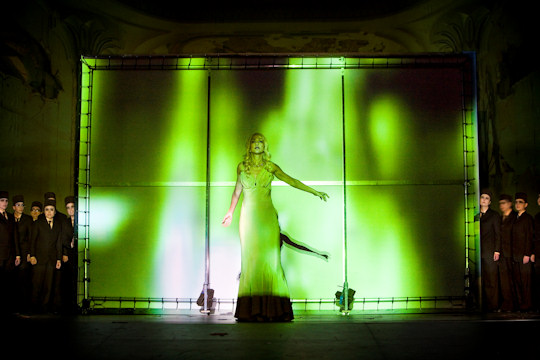 United Kingdom Rossini, Semiramide: Vlaamse Opera, Alberto Zedda (conductor). Edinburgh Festival Theatre, 27.8.2011. (SRT)
United Kingdom Rossini, Semiramide: Vlaamse Opera, Alberto Zedda (conductor). Edinburgh Festival Theatre, 27.8.2011. (SRT)

Semiramide – Myrtò Papatanasiu
Arsace – Hadar Halévy
Assur – Josef Wagner
Idreno – Robert McPherson
Oroe – Igor Bakan
Azema – Julianne Gearhart
Production – Nigel Lowery

A performance of Semiramide is a rare treat, and we should be especially grateful that, when he conducts it, Alberto Zedda insists on doing the complete version without cuts. It clocks in at around four hours of music, but it’s music of such high quality that surely only the most churlish would complain. Anyway, it’s important to have the uncut version because the proportions of Rossini’s most classical drama come into alignment much more impressively and it shows his skills as a dramatist at their most honed.
It’s even more of a treat to have it sung so well as we had here. The difficulty of the title role is the main reason why we don’t hear the opera more often, so it was thrilling to hear it sung with such flair by Myrtò Papatanasiu. She sounded fully on top of the role, getting through a long evening without a hint of strain and showing dazzling coloratura technique at every turn. She passed the big test of Bel ragghio lusinghier with flying colours but still kept enough in reserve for a most moving version of the prayer at the very end of Act 2. Just as good was the stunning Assur of Josef Wagner; rich, authoritative bass singing that you just don’t tend to get in Rossini. His vocal projection was astonishing, effectively enriching his interpretation of the character as well as demonstrating his technique. Thanks to these two the highlight of the evening came, as well it should, with their great duet that begins Act 2, as they look back on the murder of Nino with an increasing sense of horror, Rossini at his most psychologically penetrating.
Next to these two the Arsace of Hadar Halévy sounded a little palid and not quite as driven, but her technique was still excellent and her duets with Semiramide were beautiful: with these blissful moments it is clear we are only just around the corner from Norma and Adalgisa. Igor Bakan’s Oroe was a strong anchor for the action and the beautiful voice of Julianne Gearhart seemed wasted on the tiny role of Azema. The uncut version meant that we heard both of Idreno’s (dramatically expendable) arias and American tenor Robert McPherson proved himself up to the challenge, pulling runs and high notes seemingly out of thin air, though he could sound a little pinched at the very top. In the pit Zedda, surely the most experienced Rossinian we have today, kept things moving with the vigour and insight that his wide expertise have honed to a fine art, and the Vlaamse orchestra responded with plenty of bel canto flair.
What a pity that such fantastic musical values were accompanied by such a stinker of a production! Nigel Lowery made vague moves to update the action to a contemporary Middle Eastern dictatorship in collapse, no more current theme for today, but rather than taking the bull by the horns he adapted the worst possible approach by using indistinct suggestion with little dramatic integrity and nothing that effectively linked the concept together. The whole story seemed to take place in a bombed-out ballroom, making little sense of the required scene changes, and there was far too much extraneous movement on stage that seemed to make no sense whatsoever. Unforgivably, he also fluffed the biggest dramatic moments in the score, such as the appearance of the ghost in Act 1, and his default means of changing the mood seemed to be worthless green strobe lighting. The less said about this the better. Nine out of ten for the singing, one out of ten for the staging.
The Edinburgh International Festival runs until 4th September in a range of venues across the city. A selection of performances will be reviewed in these pages.
Simon Thompson